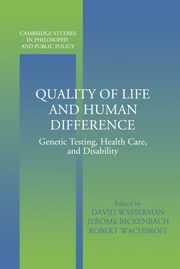Book contents
- Frontmatter
- Contents
- Contributors
- Acknowledgments
- Introduction
- 1 Assessing Quality of Life: Clinical versus Health Policy Uses
- 2 Predicting Genetic Disability while Commodifying Health
- 3 Preventing Genetically Transmitted Disabilities while Respecting Persons with Disabilities
- 4 Disability, Ideology, and Quality of Life: A Bias in Biomedical Ethics
- 5 Values for Health States in QALYs and DALYs: Desirability versus Well-Being and Worth
- 6 Preventing the Existence of People with Disabilities
- 7 Where Is the Sin in Synecdoche? Prenatal Testing and the Parent-Child Relationship
- 8 The Social Context of Individual Choice
- 9 Disability and Health Systems Assessment
- Index
9 - Disability and Health Systems Assessment
Published online by Cambridge University Press: 03 December 2009
- Frontmatter
- Contents
- Contributors
- Acknowledgments
- Introduction
- 1 Assessing Quality of Life: Clinical versus Health Policy Uses
- 2 Predicting Genetic Disability while Commodifying Health
- 3 Preventing Genetically Transmitted Disabilities while Respecting Persons with Disabilities
- 4 Disability, Ideology, and Quality of Life: A Bias in Biomedical Ethics
- 5 Values for Health States in QALYs and DALYs: Desirability versus Well-Being and Worth
- 6 Preventing the Existence of People with Disabilities
- 7 Where Is the Sin in Synecdoche? Prenatal Testing and the Parent-Child Relationship
- 8 The Social Context of Individual Choice
- 9 Disability and Health Systems Assessment
- Index
Summary
WORLD HEALTH REPORT, 2000: FROM HEALTH PROMOTION TO HEALTH SYSTEMS PERFORMANCE
With much fanfare, the World Health Organization in June 2000 set out a framework for assessing and ranking the performance of health systems around the globe (WHO, 2000). The media responded to the World Health Report, 2000 by latching onto its remarkable rankings, such as the worldwide first place position of France and the relatively low ranking of the United States (thirty-seventh). Ministries of health around the world either proudly displayed their unexpectedly high rankings, used their relative positions as an argument for reform, dismissed the exercise as an invidious “health Olympics,” or else immediately expressed concern about the quality of the data, or the methodology, that the WHO relied on. For their part, academics began to pick apart the methodology and the advisability of the ranking exercise, while rehearsing arguments for and against the various components of the framework. On its release, WHO Director General Gro Harlan Bruntland insisted that the WHO was committed to its assessment framework and planned yearly recalculations based on more valid and reliable country-level data. A few months later, facing a minor rebellion at the executive board meeting, some of Bruntland's enthusiasm was muted as she allowed that many of the concepts and measures used in the exercise “require refinement and development.”
The Report represents a shift in WHO's health promotion agenda. Two decades earlier, in the joint WHO/UNESCO Declaration of Alma-Ata (1978), universal access to primary health care was presented as the key to achieving “health for all” within the century.
- Type
- Chapter
- Information
- Quality of Life and Human DifferenceGenetic Testing, Health Care, and Disability, pp. 237 - 266Publisher: Cambridge University PressPrint publication year: 2005



